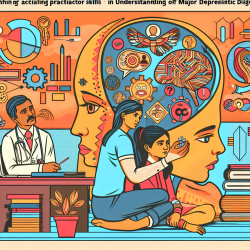Introduction
In the realm of special education and healthcare, understanding the intricate relationship between diabetes and depression is crucial for practitioners aiming to provide comprehensive care. The research article "Prevalence, awareness, treatment, and control of diabetes mellitus by depressive symptom severity: a cross-sectional analysis of NHANES 2011–2016" sheds light on this complex interplay, offering valuable insights for improving patient outcomes.
The Connection Between Diabetes and Depression
The study highlights the bidirectional causality between diabetes mellitus (DM) and depression, emphasizing the need for integrated care models. As depressive symptoms worsen, both the prevalence and awareness of diabetes increase. However, despite higher awareness, treatment and control rates are notably lower among individuals with severe depressive symptoms.
Implications for Practitioners
Practitioners in the field of special education and healthcare can leverage these findings to enhance their practice by:
- Implementing Multidisciplinary Care: Emphasize the importance of a collaborative approach that addresses both diabetes and depression. This can involve integrating mental health professionals into diabetes care teams to ensure comprehensive treatment plans.
- Focusing on Behavioral Interventions: Encourage lifestyle changes such as increased physical activity and smoking cessation, which are crucial for managing both conditions.
- Personalized Patient Education: Educate patients about the connection between their mental and physical health, empowering them to take an active role in managing their conditions.
Encouraging Further Research
The study underscores the need for further research into the specific mechanisms linking diabetes and depression. Practitioners can contribute to this body of knowledge by documenting patient outcomes and sharing insights through professional networks and publications.
Conclusion
The findings from this research highlight a critical gap in the current healthcare model, where awareness does not necessarily translate into effective treatment and control of diabetes among individuals with severe depressive symptoms. By adopting a multidisciplinary approach and encouraging further research, practitioners can play a pivotal role in bridging this gap and improving patient outcomes.
To read the original research paper, please follow this link: Prevalence, awareness, treatment, and control of diabetes mellitus by depressive symptom severity: a cross-sectional analysis of NHANES 2011–2016.










